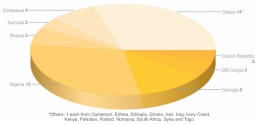ALMOST 50 asylum seekers died in Ireland during the past decade but just one case has been a definite suicide, the Department of Justice has claimed.
In a written Dáil response to Labour TD John Lyons, Minister for Justice Alan Shatter revealed that some 49 asylum seekers are recorded to have died since 2002.
The Reception and Integration Agency (RIA), a division of the Department of Justice which oversees asylum seeker accommodation, has since claimed that “only one of these deaths can with certainty be said to involve a suicide and this took place in a hospital in 2008”.
The body said that in some cases it did not know the cause of death. “[The] RIA is not a medical body and it does not, indeed cannot, hold or have access to death certificates,” it said.
Pastor Amos Ngugi of Act of Compassion Ministries – which voluntarily works with asylum seekers experiencing emotional problems – said he couldn’t comment on whether the RIA statistic denoting one suicide was accurate.
He said he had heard rumours which suggested more than one suicide, but stressed he could not yet substantiate this.
However, the Kenyan-born pastor and former hospital chaplain noted that depression – which in severe cases can lead to suicide – is a “major issue” in RIA accommodation centres.
“What I do know 100 per cent is that depression is a major problem,” he remarked.
Almost 50,000 asylum seekers have been accommodated by the RIA and its predecessor body since April 2000, and the collation of death statistics commenced in 2002. Most deaths occurred outside of accommodation centres in hospitals and other locations, according to Minister Shatter.
Sue Conlan, chief executive of the Irish Refugee Council, commented that direct provision “was designed to provide short-term accommodation to applicants for refugee status. It was envisaged that no-one would stay in direct provision for longer than six months, but it has been used to house families and individuals for years on end.
She continued: “Residents in direct provision live in conditions that are not designed as long-term living space, where they have no control over meals... and can be transferred without consultation. In these circumstances, residents become de-skilled, isolated from society and often suffer poor health, including mental health. It is not surprising that so many have died.
Conlan said it is “of grave concern that so little is known about the cause of death” of the 49 “and how the whole experience in direct provision may have contributed to the deterioration in their health”.
Under the direct provision accommodation system, adult residents receive €19.10 per week and children €9.60, but are disallowed from working or accessing third level education.
Just over 5,400 people are currently living in centres across the country, under a system recognised in a HSE report as having potentially detrimental effects on residents’ mental health.
A “prolonged” stay may have a “direct negative effect on overall wellbeing,” stated the HSE’s intercultural strategy in 2007.
“Lack of entitlement to work, when this restriction extends over a long period, may further compound mental health, with boredom, depression, sense of isolation and loss of self esteem commonly reported symptoms,” it noted.
Presently, almost half of all residents have been in direct provision centres for over three years, with some delays attributed to the high rates of judicial reviews taken by failed applicants.
Last month, the UN Committee Against Torture expressed concern at Ireland’s low recognition rate of refugees, with the number of asylum seekers granted refugee status by the Office of the Refugee Applications Commissioner - the first instance body on refugee applications – at below 1.5 per cent in 2010.
The Department of Justice has denied that Ireland’s treatment of asylum cases is unfair.












